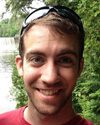Richard Buzard discusses his graduate studies in geology at University of Alaska Fairbanks

Richard Buzard ('15, Environmental Science) is a master’s candidate studying geology and remote sensing at the University of Alaska Fairbanks. He uses aerial and satellite imagery, unmanned aerial vehicles, and high-grade GPS to measure changes in Alaska’s coastline. Richard is currently an Alaska Sea Grant fellow working on two projects which aim to determine past and current rates of shoreline retreat in nearly a dozen villages surrounding Bristol Bay. He is working closely with partners from the Department of Natural Resources, NOAA, Borough of Indian Affairs, Bristol Bay Native Association, and several Alaskan organizations. While his objectives are primarily focused on producing high-resolution datasets, a bulk of the work hinges communicating with people from diverse backgrounds.
Richard transferred to UW Bothell from Cascadia Community College, focusing on Environmental Sciences and GIS. His coursework in earth system sciences, writing and communication, and environmental law proved invaluable when applying for graduate school. His undergraduate research, using microscopic fossils as proxies for climate indicators, facilitated the transition from academia to real-world scientific research and writing. Richard will be pursuing a Ph.D. in geology at UAF, and hopes to expand his shoreline monitoring project across Alaska’s coastline.
During Richard’s campus visit, he imparted the following advice to students:
- A key lesson from interdisciplinary education is learning how to learn new things and apply that knowledge to solve old problems. Once you get the job, this invaluable skill will set you apart. But in your application you need evidence to show you possess it.
- Don’t underestimate peer review. Strong writers can always learn by reading others’ writing. If people cannot understand your writing, it is not strong writing.
- Graduate school is a big commitment, so make sure you are applying for something you would like to do. Taking a gap year (or more) to work in a related field will keep you connected to your degree, strengthen your resume and CV, and help you decide if graduate school is the next step.
-
You want a mentor that is a good fit for you, as you’ll be working closely together and rely on each other. Be professional in your correspondence, but be yourself, too. The more you get along, the more they will refer you to others and open doors for your professional development.
